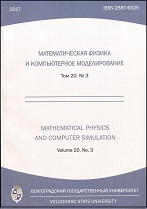|
Mathematics and mechanics
On approximation of the functions of two variables by some Fourier integrals
Yu. Kh. Khasanov
Russian-Tajik Slavonic University
Abstract:
This paper we studies some issues on the deviation of the functions of two variables $f(x,y)$ defined on the whole two-dimensional space from integral mean values of their Fourier transforms in the metric of the space $L_p (R^2 )\,\,\,(1\leq p < \infty)$.
Let $L_p (R^2 )\,\,\,(1\leq p < \infty)$ stand for the space of measurable functions $f(x,y)$ such that
$$
\|f(x,y)\|_{L_p}=\left\{\int\limits_{-\infty}^\infty\int\limits_{-\infty}^\infty|f(x,y)|^pdxdy\right\}^{\frac{1}{p}}<\infty\,\,\,(1\leq p<\infty),
$$
$$
\|f(x,y)\|_{L_\infty}=vrai\sup_{x,y}|f(x,y)|<\infty,
$$
and almost everywhere there exists the Fourier transform
$$
F(t,z)=\frac{1}{2\pi}\int\limits_{-\infty}^\infty\int\limits_{-\infty}^\infty f(u,v) \exp(-i(tu+zv))dudv,
$$
where
$$
F(t,z)\in L_q(R^2)\,\,\,(\frac{1}{p}+\frac{1}{q}=1).
$$
For any $\sigma>0$ we consider
$$
S_{\sigma,\sigma}(f;x,y)=\int\limits_{-\sigma}^\sigma\int\limits_{-\sigma}^\sigma F(t,z) \exp(i(tx+zy))dtdz=
$$
$$
=\int\limits_0^\sigma\left\{\int\limits_{-u}^uA(t,u)dt+\int\limits_{-u}^uA(t,-u)dt+\int\limits_{-u}^uA(u,z)dz+\int\limits_{-u}^uA(-u,z)dz\right\}du=
$$
$$
=\int\limits_0^\sigma S_{u,u}^*(f;x,y)du,
$$
where
$A(t,z)=F(t,z)\exp(i(tx+zy))$.
This paper estimates the value
$$
R_{\sigma,r}(f)_{L_p}=\|f(x,y)-U_{\sigma,r}(f;x,y)\|_{L_p},
$$
where
$$
U_{\sigma,r}(f;x,y)=\int\limits_0^\sigma \left(1-\frac{u^r}{\sigma^r}\right) S_{u,u}^*(f;x,y)du.
$$
Theorem 1. If $f(x,y)\in L_p(R^2)\,\,\,(1<p\leq 2)$, then the following bound is valid
$$
R_{\sigma,r}(f)_{L_p}\leq C_{p,r}\left\{\omega_r^{(1)}(f;\frac{1}{\sigma})_{L_p}+\omega_r^{(2)}(f;\frac{1}{\sigma})_{L_p}\right\},
$$
where
$$
\omega_r^{(1)}(f;u)_{L_p}=\sup_{|h|\leq u}\|\Delta_{x,h}^rf\|_{L_p}=
\sup_{|h|\leq u}\left\|\sum_{\nu=0}^r(-1)^{r-\nu}(_\nu^r)f(x+\nu h,y)\right\|_{L_p},
$$
$$
\omega_r^{(2)}(f;u)_{L_p}=\sup_{|h|\leq u}\|\Delta_{h,y}^rf\|_{L_p}=
\sup_{|h|\leq u}\left\|\sum_{\nu=0}^r(-1)^{r-\nu}(_\nu^r)f(x,y+\nu h)\right\|_{L_p},
$$
$C_{p,r}$ is a constant value that depends only on $p$ and $r$.
Theorem 2. Under the assumptions of Theorem 1 with $1<p\leq 2$ the following bound is valid
$$
\omega_r^{(\nu)}(f;\frac{1}{\sigma})_{L_p}\leq M_{p,r}R_{\sigma,r}(f)_{L_p}\,\,\,(\nu=1,2),
$$
where the constant $M_{p,r}$ depends only on $p$ and $r$.
Keywords:
function of two variables, Fourier series, Fourier transformation, partial sums of Fourier series, integral mean values, entire function of finite order, best approximation, modulus of continuity.
Citation:
Yu. Kh. Khasanov, “On approximation of the functions of two variables by some Fourier integrals”, Mathematical Physics and Computer Simulation, 22:1 (2019), 24–34
Linking options:
https://www.mathnet.ru/eng/vvgum247 https://www.mathnet.ru/eng/vvgum/v22/i1/p24
|

|




 Contact us:
Contact us: Terms of Use
Terms of Use
 Registration to the website
Registration to the website Logotypes
Logotypes








 Citation in format
Citation in format 